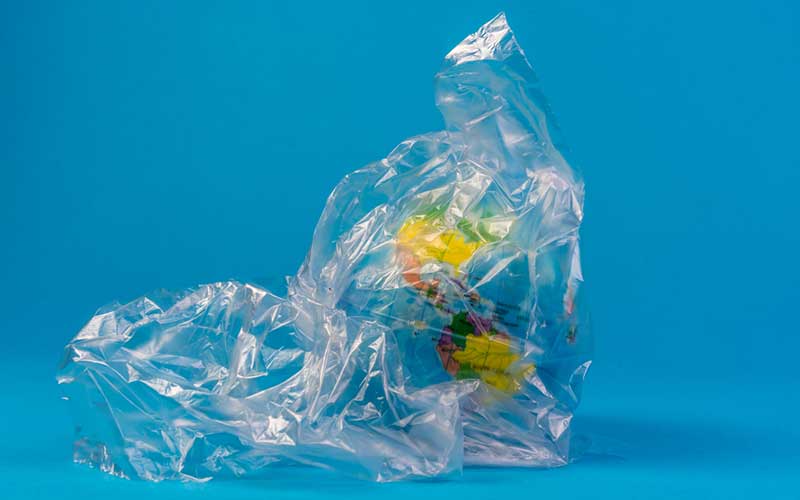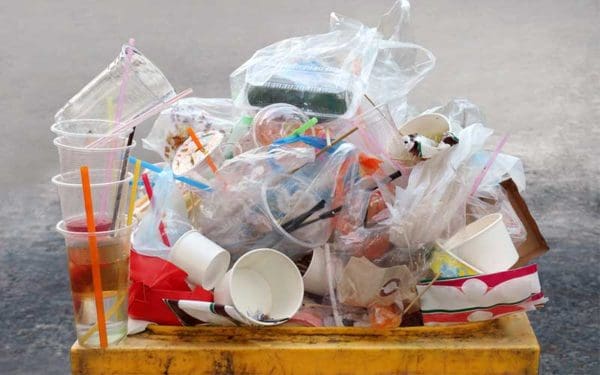
Plastic is ubiquitous in our lives. But now, 175 countries are saying enough is enough. Photo: via Shutterstock
The most important environmental pact since the 2015 Paris Climate Agreement – that’s how the director of the United Nations Environmental Programme describes a new agreement for global plastics pollution. The 175 nations – including the U.S. – that signed on to the agreement will now draft and enter into a legally binding treaty to address the impacts of plastic production, design, and disposal.
Why compare this mandate to the landmark Paris Agreement? Because just like the climate crisis, plastics pollution is broad in scope, pervasive, and toxic to communities. What’s more, it’s inextricably linked to climate damage.
If done right, this treaty will profoundly impact public health and our environment in ways that rival, if not exceed, the Paris Agreement. But for that to happen, we must ensure that the treaty limits global plastic production, restricts toxic additives in plastic, and holds plastic manufacturers accountable for their pollution.
What a Global Plastic Treaty Means for the U.S. – and the World
At every stage of their lifecycle – or, more accurately, “death cycle” – plastics endanger our health, environment, and climate.
For too long, the world has treated plastic as a waste disposal problem that can be solved through improved collection and recycling. In reality, climate damage, toxic pollution, and environmental injustice start at the very beginning of this death cycle. Plastic pollutes from the moment we extract its building blocks – fossil fuels – from the ground. So, to truly tackle our plastic crisis, we need to stop plastic production at its source.
The plastic treaty can do just that – on a global scale. With this treaty, the world can finally force corporate polluters to turn off the plastics tap. That means the treaty must:
- Significantly limit global plastics production,
- Restrict toxic additives, including PFAS, in plastic,
- Provide a roadmap and incentives for reusable packaging and materials,
- Include measures to improve recyclability, phase out unrecyclable plastics, and hold plastics producers accountable, and
- Reflect and incorporate the needs and perspectives of local and global communities – especially historically marginalized groups – through an inclusive and responsive negotiating process.
If the 175 nations who agreed to draft a comprehensive plastic treaty include these elements, we can look forward to a world free from the plastics death cycle. What’s more, the plastic that does enter our lives will be less toxic.
Measures like these could also significantly confront the climate damage, human rights abuses, health impacts, and environmental injustices that come with runaway plastics production – on the local, national, and global level. That the world is moving forward with a global plastic treaty tells us that people have had enough.
What the Plastic Treaty Must Avoid
Although the newly signed agreement sets the world on a path toward a legally binding treaty, the Intergovernmental Negotiating Committee drafting the treaty won’t finish its work until 2024. By the end of 2022, the United Nations Environment Programme plans to convene an open forum to incorporate knowledge, science, and best practices – from stakeholders across the world – into the draft treaty.
The UN and the Negotiating Committee must proceed with caution. Plastics industry lobbyists will try to water down and compromise the treaty at every step.
In fact, the petrochemical lobby – led, as always, by the American Chemistry Council – is already trying to steer the process toward waste collection and recycling. Treating plastics as a disposal, rather than production, problem helped create this crisis in the first place. We cannot let the industry lead us down this polluting dead end.
The American Chemistry Council is also urging U.S. lawmakers to fast-track the building and operation of plastic-burning facilities. Any boost to high-heat plastics technology – like gasification, pyrolysis, or so-called “chemical” or “advanced” recycling – would undercut the goals of the treaty process and worsen our plastic pollution crisis.
Plastic-burning technology has no place in a treaty intended to address the harms that come with the full cycle of plastics pollution.
The Time to Act is Now
Plastic is ubiquitous in our lives. But now, 175 countries are saying enough is enough. Together, we have an opportunity to limit single-use plastics and plastic packaging worldwide.
This is a vital moment for our planet. As we wait for the next steps in the treaty drafting process, stay tuned for announcements from the UN Environmental Programme. When the time comes, we must make the most of this opportunity and push for a treaty that limits plastics production and protects communities and our climate from the plastics “death cycle.”



